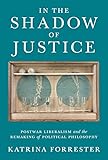In the Shadow of Justice : Postwar Liberalism and the Remaking of Political Philosophy / Katrina Forrester.
Material type: TextPublisher: Princeton, NJ : Princeton University Press, [2019]Copyright date: ©2019Description: 1 online resource (432 p.)Content type:
TextPublisher: Princeton, NJ : Princeton University Press, [2019]Copyright date: ©2019Description: 1 online resource (432 p.)Content type: - 9780691163086
- 9780691189420
- online - DeGruyter
- Issued also in print.
| Item type | Current library | Call number | URL | Status | Notes | Barcode | |
|---|---|---|---|---|---|---|---|
 eBook
eBook
|
Biblioteca "Angelicum" Pont. Univ. S.Tommaso d'Aquino Nuvola online | online - DeGruyter (Browse shelf(Opens below)) | Online access | Not for loan (Accesso limitato) | Accesso per gli utenti autorizzati / Access for authorized users | (dgr)9780691189420 |
Browsing Biblioteca "Angelicum" Pont. Univ. S.Tommaso d'Aquino shelves, Shelving location: Nuvola online Close shelf browser (Hides shelf browser)

|

|

|

|

|

|

|
||
| online - DeGruyter The Book of Exodus : A Biography / | online - DeGruyter Frederick the Great's Philosophical Writings / | online - DeGruyter The Life of Saint Teresa of Avila : A Biography / | online - DeGruyter In the Shadow of Justice : Postwar Liberalism and the Remaking of Political Philosophy / | online - DeGruyter The Code of Capital : How the Law Creates Wealth and Inequality / | online - DeGruyter Chasing Innovation : Making Entrepreneurial Citizens in Modern India / | online - DeGruyter The Voucher Promise : "Section 8" and the Fate of an American Neighborhood / |
Frontmatter -- Contents -- Preface -- 1. The Making of Justice -- 2. Obligations -- 3. War and Responsibility -- 4. The New Egalitarians -- 5. Going Global -- 6. The Problem of the Future -- 7. New Right and Left -- 8. The Limits of Philosophy -- Epilogue -- Acknowledgments -- Notes -- Index
restricted access online access with authorization star
http://purl.org/coar/access_right/c_16ec
A history of how political philosophy was recast by the rise of postwar liberalism and irrevocably changed by John Rawls's A Theory of JusticeIn the Shadow of Justice tells the story of how liberal political philosophy was transformed in the second half of the twentieth century under the influence of John Rawls. In this first-ever history of contemporary liberal theory, Katrina Forrester shows how liberal egalitarianism-a set of ideas about justice, equality, obligation, and the state-became dominant, and traces its emergence from the political and ideological context of the postwar United States and Britain.In the aftermath of the civil rights movement and the Vietnam War, Rawls's A Theory of Justice made a particular kind of liberalism essential to liberal philosophy. Using archival sources, Forrester explores this liberalism's ascent and legacy by examining its origins in midcentury debates among American antistatists and British egalitarians. She traces the roots of contemporary theories of justice and inequality, civil disobedience, just war, global and intergenerational justice, and population ethics in the 1960s and '70s and beyond. In these years, political philosophers extended, developed, and reshaped this liberalism as they responded to challenges and alternatives on the left and right-from the New International Economic Order to the rise of the New Right. These thinkers remade political philosophy, in ways that influenced not only their own trajectory, but also that of their critics.Recasting the history of late twentieth-century political thought and providing novel interpretations and fresh perspectives on major political philosophers, In the Shadow of Justice offers a rigorous look at liberalism's ambitions and limits.
Issued also in print.
Mode of access: Internet via World Wide Web.
In English.
Description based on online resource; title from PDF title page (publisher's Web site, viewed 21. Jun 2021)


